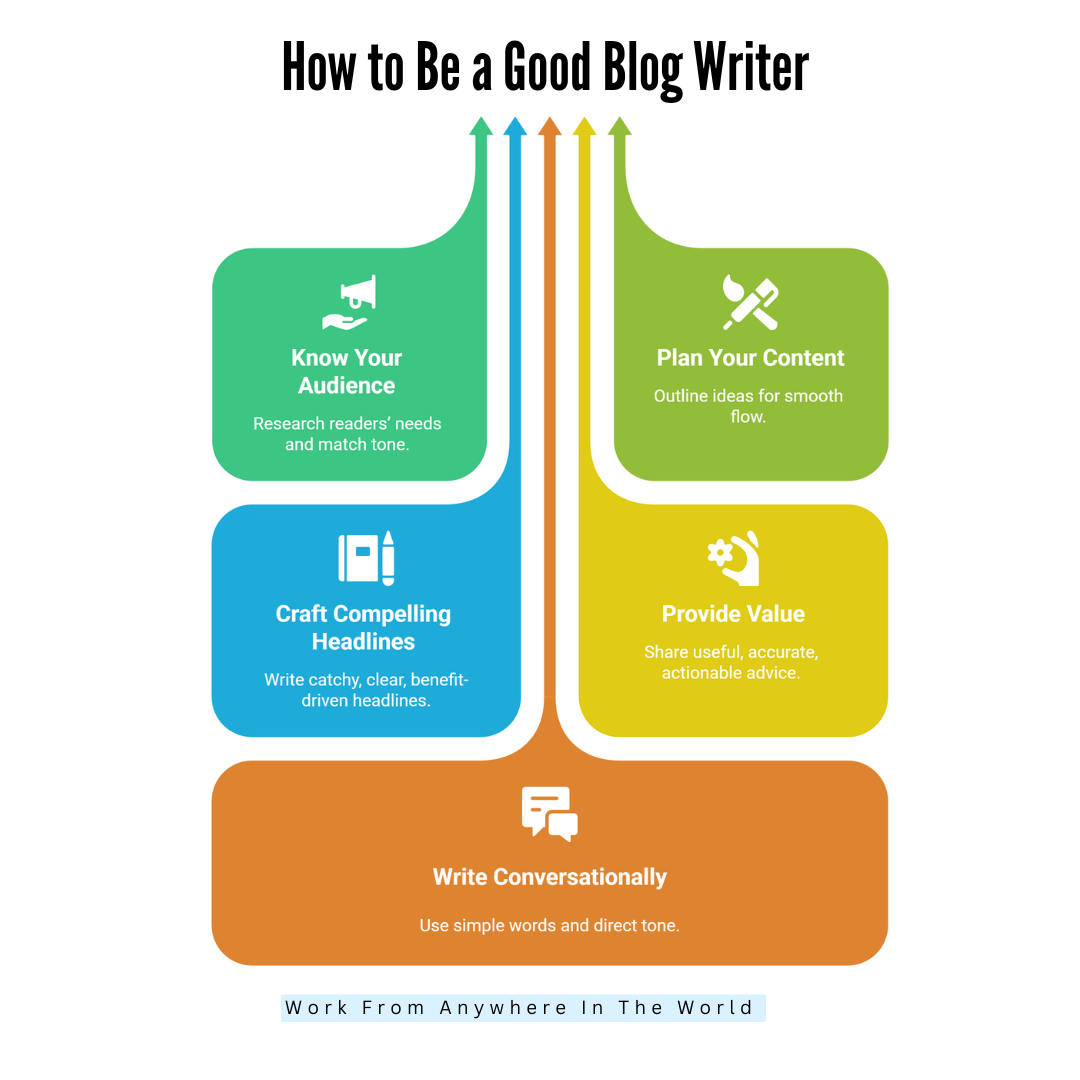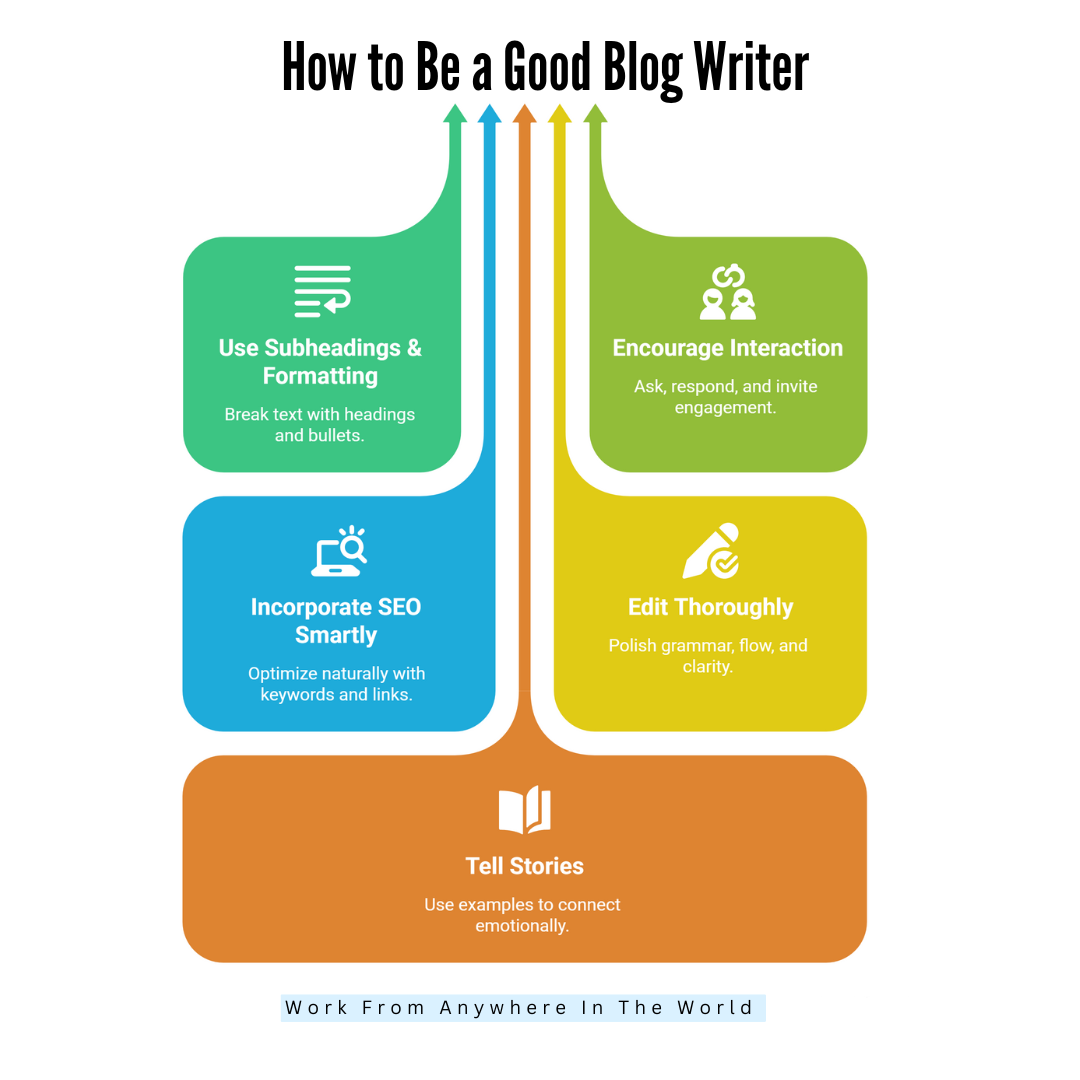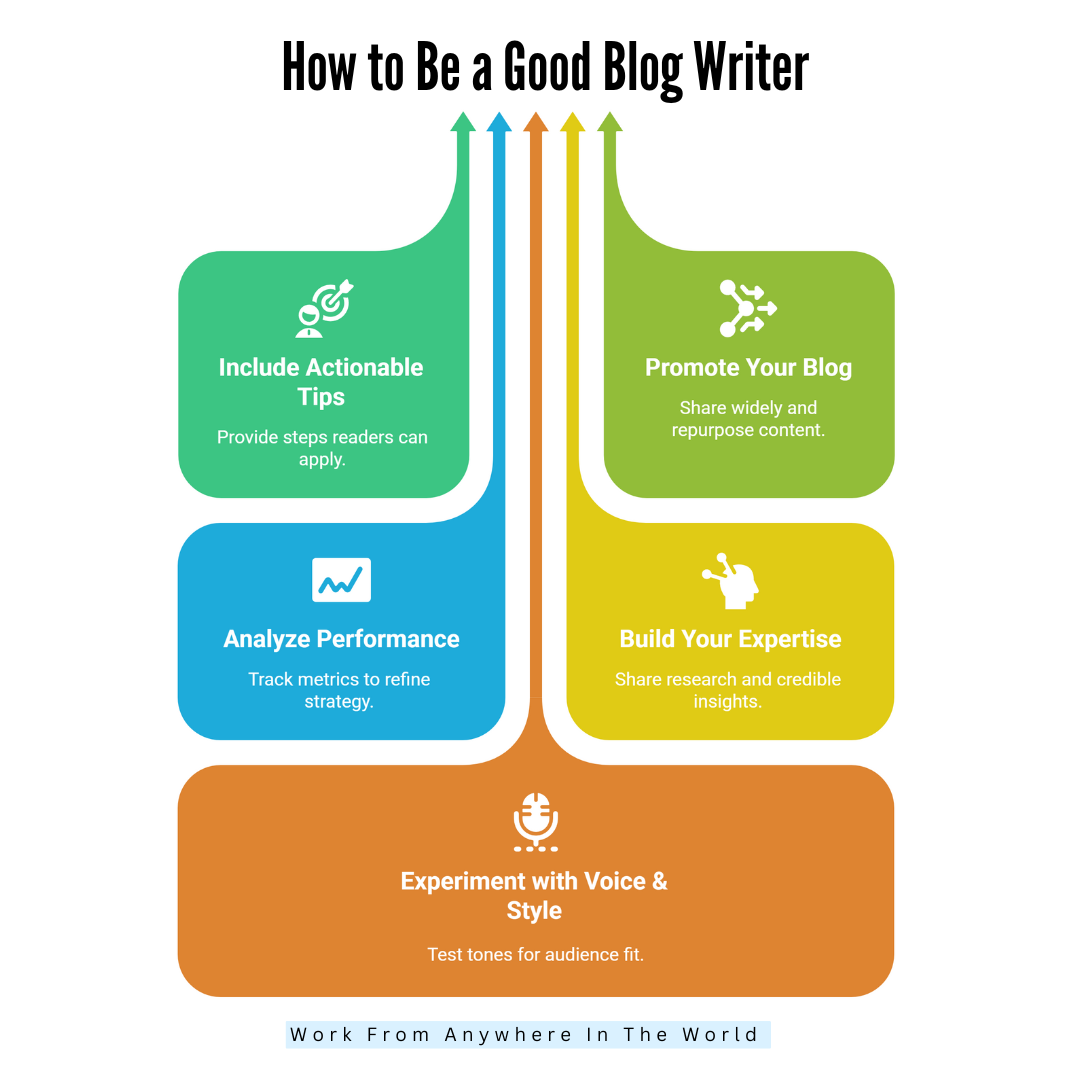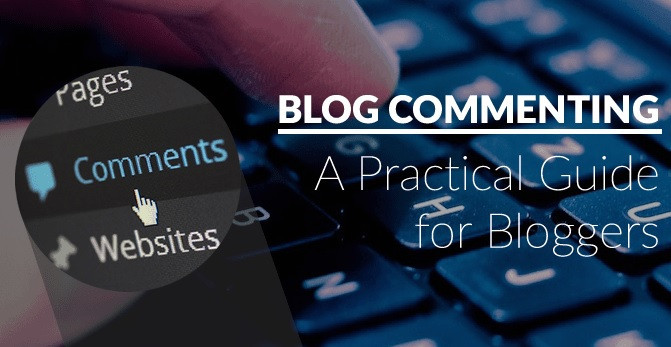How To Be A Good Blog Writer With Ultimate Tips For Success
Becoming a good blog writer takes more than just typing words—it’s about connecting with readers, delivering value, and keeping them engaged.
Learning how to be a good blog writer means focusing on your audience, clarity, and providing valuable content consistently.
To increase originality, enhance readability, and differentiate your blog articles in the cluttered digital landscape of today, this tutorial takes you through easy, doable steps. Ready to write content people love to read? Let’s dive in!
How To Be A Good Blog Writer With Ultimate Tips For Success
1. Know Your Audience
Writing a great blog starts with understanding your readership. You can’t create content that resonates if you don’t know who’s reading it. Start by researching their interests, struggles, and questions.
Look at what they talk about on social media or forums. Notice their tone—formal, casual, humorous? Write in a way that matches their style. When readers feel you understand them, they’ll trust you.
This builds loyalty and keeps them coming back. Always keep your audience in mind while brainstorming topics, writing, and editing. It makes every word count.
Key Points
- Research audience interests before writing your blog.
- Understand reader problems to provide valuable solutions.
- Match writing tone with the audience's communication style.
- Build trust by showing understanding and empathy.
2. Craft Compelling Headlines
Readers will notice your headline first. They won't read on if it doesn't catch their interest. Make it clear, catchy, and benefit-driven.
Use action words that make readers curious. Include numbers, questions, or emotional triggers to make it irresistible. Keep it short and to the point. Test different headlines to see which performs best.
A strong headline tells readers exactly what to expect while giving them a reason to click. Investing time in headlines ensures your content reaches and engages more readers from the very beginning.
Key Points
- Use clear and catchy words for headlines.
- Include numbers or questions to draw attention.
- Create curiosity without misleading the reader.
- Test headlines to see which performs best.
3. Write Conversationally
Writing like you speak makes your blog more enjoyable. Short sentences and simple words make it easy to read. Use “you” and “we” to create a connection. Ask questions to engage your readers.
Avoid heavy jargon unless your audience expects it. Reading aloud helps check the flow and tone. Conversational writing feels personal, making readers trust you and stay longer.
It also increases shares and comments because people relate to it. Remember, blogs aren’t academic papers—they’re meant to connect, inform, and entertain your audience in a friendly and approachable way.
Key Points
- Use short sentences for better readability.
- Address readers directly using “you” and “we.”
- Ask questions to engage and involve readers.
- Avoid complex jargon unless the audience expects it.
4. Plan Your Content
Before writing, plan your blog. Outline initially to help you organize your ideas. Provide an introduction, a list of the essential ideas, and a conclusion. This keeps your writing focused and structured.
Planning also saves time when drafting because you know exactly what to cover. Decide which examples, images, or links will support your points. Think about the flow so readers can easily follow your ideas.
A well-planned blog looks professional, reads smoothly, and keeps readers interested from start to finish. Planning ensures no essential points are left out and helps you create content that delivers real value.
Key Points
- Create an outline before starting your blog.
- Organize content with an introduction and a conclusion.
- Plan examples and visuals to support points.
- Ensure smooth flow for easy reader understanding.
5. Provide Value
Understanding how to be a good blog writer involves providing valuable content that solves problems and engages your readers consistently. Readers return for more when they find useful material.
Pay attention to the issues that matter most to your audience. Include tips, actionable steps, or resources they can use. Avoid filler or fluff just to reach a word count.
Research thoroughly so your information is accurate and reliable. When readers feel they’ve learned something important, they’ll trust you and share your content.
Providing consistent value builds authority in your niche and strengthens relationships with your audience, making them more likely to subscribe, follow, or engage with your content.
Key Points
- Focus on solving readers’ problems effectively.
- Offer actionable tips readers can use immediately.
- Research thoroughly to ensure accurate information.
- Avoid unnecessary filler just to reach word count.

6. Use Subheadings & Formatting
Breaking your blog into sections improves readability. Subheadings guide readers through your ideas. Use bullet points, numbered lists, or short paragraphs to keep the page organized.
Highlight important words or phrases to emphasize key points. This helps readers scan content. Proper formatting makes your blog look professional and encourages readers to stay longer.
Visual breaks reduce fatigue and improve comprehension. Even complex topics become easier to digest when formatted clearly.
Always review your layout and headings before publishing. A well-structured blog communicates information efficiently while keeping readers engaged and focused.
Key Points
- Break text with clear subheadings and sections.
- Use bullet points for easy scanning and reading.
- Highlight keywords to emphasize important ideas.
- Keep paragraphs short for better readability.
7. Incorporate SEO Smartly
Optimizing your blog helps it reach more readers. Include relevant keywords naturally without overstuffing. Add meta descriptions and alt text for images—link to both internal pages and trusted external sources.
Proper SEO increases visibility on search engines and attracts organic traffic. Focus on user experience while optimizing—content should remain clear and readable. Avoid keyword stuffing or tricks that hurt credibility.
Track your blog’s performance with analytics to improve future posts. Smart SEO ensures your hard work reaches the audience who will benefit most, increasing engagement and potential shares.
Key Points
- Use keywords naturally without overstuffing content.
- Include alt text and meta descriptions for your photographs.
- Include internal and external trusted links.
- Focus on user experience while optimizing SEO.
Wealthy Affiliate – Mini Review (2025)
If you’ve ever thought about turning your blog, passion, or niche into an online business,
Wealthy Affiliate (WA) is one of the most beginner-friendly platforms I’ve used.
It combines step-by-step training, website hosting, SEO research tools,
and an active community all in one place.
What I like most: you can start free (no credit card needed),
explore lessons, test the tools, and connect with other entrepreneurs
before upgrading. WA isn’t a “get rich quick” scheme — it’s a platform where success comes
from consistent effort and applying what you learn.
8. Tell Stories
Stories make your blog relatable and memorable. Use personal experiences, case studies, or examples to illustrate points. Storytelling engages readers emotionally and encourages them to keep reading.
Knowing how to be a good blog writer means using storytelling to make your content relatable, memorable, and engaging for readers. Include characters, challenges, and solutions to create a narrative.
Stories build trust because they show authenticity. Use anecdotes sparingly to reinforce key messages without overwhelming the content.
Readers remember stories better than plain facts, making your blog more impactful. Combining storytelling with useful information keeps your content both entertaining and valuable.
Key Points
- Use personal experiences to engage your audience.
- Include examples to illustrate key points clearly.
- Build emotional connection through relatable stories.
- Reinforce main ideas without overloading anecdotes.
9. Edit Thoroughly
Editing is where your blog becomes professional. Check for grammar, spelling, and punctuation errors. Review sentence flow and clarity. Remove unnecessary words or repetitive phrases.
Tools like Grammarly or Hemingway help polish writing. Reading aloud uncovers awkward sentences and improves tone. Edit multiple times if necessary, focusing on structure first, then language. Tight editing ensures every word adds value.
A well-edited blog builds credibility and leaves a positive impression. Don’t rush this step—publishing without editing can reduce trust and engagement. Polished content increases readability and encourages readers to return.
Key Points
- Check grammar, spelling, and punctuation carefully.
- Review the flow and clarity of every sentence.
- Remove repetition or unnecessary filler words.
- Edit multiple times for polished professional content.
10. Encourage Interaction
Invite readers to engage with your blog. Ask questions, create polls, or encourage comments. Include calls-to-action, like subscribing, sharing, or downloading resources. Engagement builds community and keeps readers invested.
Responding to comments increases loyalty and shows you value feedback. Interaction also helps your blog reach more people via social sharing. Make it easy for readers to interact by providing buttons or links.
Engagement strengthens your blog’s impact, helps with SEO, and builds lasting relationships. When readers feel included, they return, share, and promote your content naturally.
Key Points
- Ask questions to encourage reader interaction.
- Include calls-to-action for subscriptions or sharing.
- Respond to comments to build community trust.
- Make engagement easy with visible buttons.

11. Focus On Readability
Readability is essential for keeping readers. Use short paragraphs, simple words, and clear fonts. White space prevents visual fatigue. Avoid dense blocks of text that overwhelm readers.
Break content with headings, bullet points, or images. Use active voice for clarity and flow. Readability also improves SEO and increases engagement. Make sure your blog is readable on all devices by testing it on a variety of them.
Clear formatting and smooth flow make information easier to absorb. High readability keeps readers on your page longer and encourages them to share your content.
Key Points
- Use short paragraphs and simple words consistently.
- Add headings and bullet points for structure.
- Include white space to reduce visual fatigue.
- Test content readability on multiple devices.
12. Use Visuals Wisely
Images, infographics, and videos make blogs more engaging. Visuals help explain complex ideas quickly. Use high-quality and relevant visuals that complement your text. Include captions or descriptions for clarity and accessibility.
Infographics summarize information for easy understanding. Videos can demonstrate steps or provide additional context.
Avoid overloading pages with unnecessary visuals that distract readers. Properly optimized images improve SEO and page load times.
Visuals also make content more shareable on social media. Well-chosen visuals keep readers engaged, improve comprehension, and create a more professional, appealing blog experience.
Key Points
- Use high-quality visuals relevant to your content.
- Include captions to explain images clearly.
- Optimize images to improve page loading speed.
- Avoid unnecessary visuals that distract readers.
13. Master The Introduction
Your introduction hooks readers in the first few sentences. Start with a question, a surprising fact, or a problem your audience faces. Give a clear explanation of the blog's topics and their importance.
Keep it short, engaging, and informative. A strong introduction encourages readers to continue to the main content. Avoid long-winded background information that loses attention.
The introduction sets the tone, builds curiosity, and frames expectations. A compelling opening creates trust and establishes your authority, making readers more likely to stay, read, and share your blog.
Key Points
- Start with a question or a surprising fact.
- Clearly state what your blog will cover.
- Keep introductions short and engaging for readers.
- Set tone and expectations from the beginning.
14. Be Authentic
Authenticity builds trust and loyalty. Let your personality show in your writing. Share honest opinions and experiences. Avoid copying others or using unnatural tones.
Readers connect with genuine voices, not overly polished or robotic content. Authenticity also encourages engagement, as readers feel more comfortable interacting.
Be transparent about sources and opinions to strengthen credibility. Writing authentically doesn’t mean perfect grammar—it means honest communication that resonates.
Your voice sets you apart from others in your niche. Authentic blogs attract readers who appreciate your perspective and return for future content.
Key Points
- Show your personality in every blog post.
- Share honest opinions and personal experiences.
- Avoid copying others’ voices or content.
- Build credibility through transparent communication.
15. Update Old Content
Refreshing older posts keeps them relevant and valuable. Update facts, statistics, or references to maintain accuracy. Add new examples or visuals to enhance understanding.
Refreshing content improves SEO by showing search engines your site is active. Updating links prevents broken pages that frustrate readers.
Repurposing older content saves time while maximizing impact. Regular updates show readers you care about providing current, reliable information.
Well-maintained blogs maintain authority, engagement, and trust. Don’t let valuable content fade—revisit and improve posts to keep them performing at their best.
Key Points
- Update outdated facts and statistics regularly.
- Add new examples to improve clarity.
- Refresh links to prevent broken references.
- Maintain authority by keeping content current.

16. Include Actionable Tips
Readers love content they can use immediately. Offer step-by-step guidance or practical examples. Focus on solutions rather than theory. Make instructions clear, concise, and easy to follow. Highlight important points for quick reference.
Actionable tips increase reader satisfaction and loyalty. They also improve shares as readers pass on valuable advice. Use checklists, templates, or how-to guides to enhance usability.
Actionable content makes your blog memorable and positions you as a helpful, reliable source. Always think, “How can my reader implement this today?” when creating content.
Key Points
- Provide step-by-step guidance that readers can follow.
- Focus on practical solutions, not theory.
- Highlight key points for easy reference.
- Include templates or checklists to help readers.
17. Analyze Performance
Tracking your blog’s performance reveals what works. Use analytics to monitor views, clicks, and engagement. See which topics resonate most with readers.
Track referral sources to optimize promotion strategies. Analyze bounce rates to improve content quality. Use data to refine headlines, formatting, and posting schedules.
Performance analysis helps you create content that attracts and retains readers. Regularly reviewing metrics improves your blogging strategy over time.
Understanding patterns ensures future posts meet audience needs and increase reach. Data-driven decisions make your blog more effective and help you grow consistently.
Key Points
- Monitor views, clicks, and engagement metrics.
- Identify which topics resonate with readers.
- Analyze bounce rates to improve content quality.
- Use data to refine headlines and format.
18. Experiment With Voice & Style
Testing different writing styles keeps your blog fresh. Use humour, storytelling, or formal tones to see what resonates. Experimenting helps you understand your audience’s preferences.
Switching voices occasionally can make content more engaging. Style experimentation also distinguishes you from other bloggers.
Maintain readability and clarity while trying a new tone—tracking engagement to measure effectiveness. Evolving your voice over time helps build a unique identity.
Being flexible allows you to adapt to trends while staying true to your core brand. Always balance creativity with clarity to maintain reader trust.
Key Points
- Test humour or storytelling in your content.
- Experiment with formal or casual tones.
- Track engagement to measure style effectiveness.
- Balance creativity with clear communication consistently.
19. Build Your Expertise
Research and credibility make your blog trustworthy. Cite reliable sources and provide evidence for claims. Share your experiences to demonstrate knowledge.
Authority encourages readers to trust and follow your blog. Continuously learning keeps your content accurate and relevant. Providing expert insights differentiates your blog from others.
Your expertise attracts loyal readers and encourages shares. Combining personal knowledge with external research strengthens your position in your niche.
Being credible improves engagement, SEO, and your reputation. Always fact-check and back claims to maintain authority and build long-term audience trust.
Key Points
- Cite reliable sources to support your claims.
- Share experiences to demonstrate subject knowledge.
- Continuously research to keep content relevant.
- Provide expert insights to differentiate your blog.
20. Promote Your Blog
Even the best content needs promotion. Share posts on social media, newsletters, or online communities. Collaborate with influencers or other bloggers to reach more readers.
Use SEO and hashtags strategically to attract targeted audiences. Promotion increases visibility, engagement, and shares. Repurpose content into videos, infographics, or slides to reach different platforms.
Encourage readers to share your blog to expand reach. Consistent promotion ensures your content doesn’t go unnoticed. Strategic marketing amplifies your efforts and grows your readership faster than relying on organic traffic alone.
Key Points
- Share blogs on social media and newsletters.
- Collaborate with influencers or other bloggers.
- Use SEO and hashtags to attract an audience.
- Repurpose content to reach more platforms.

Conclusion
Good blog writing is about connecting, informing, and engaging your readers consistently. Learning how to be a good blog writer involves connecting with readers, providing value, and consistently refining your skills.
Use clear formatting, visuals, and actionable tips to keep content readable and impactful. Continually analyze performance, experiment with style, and promote your posts to reach more readers.
Anyone can learn to blog with commitment, practice, and focus. Your words can inspire, educate, and leave a lasting impression on your audience.
I trust you enjoyed this article on How to Be A Good Blog Writer With Ultimate Tips for Success. Please stay tuned for more insightful blogs on affiliate marketing, online business, and working from anywhere in the world.
Take care!
— JeannetteZ
💬 Your Opinion Is Important To Me
Do you have thoughts, ideas, or questions? I’d love to hear from you. Please leave your comments below or email me directly at Jeannette@WorkFromAnywhereInTheWorld.com.
📚 More Work From Anywhere Reads
🚀 Ready to Build a Business You Can Run from Home
or from Anywhere in the World?
Imagine creating income on your terms — from home, a cozy café, or wherever life takes you.
With the right tools, training, and community support, it’s entirely possible.
Start your own online business for free — no credit card needed.
Disclosure
This post may contain affiliate links. As an Amazon Associate and participant in other affiliate programs, I earn from qualifying purchases at no extra cost to you. Please read my full affiliate disclosure.







